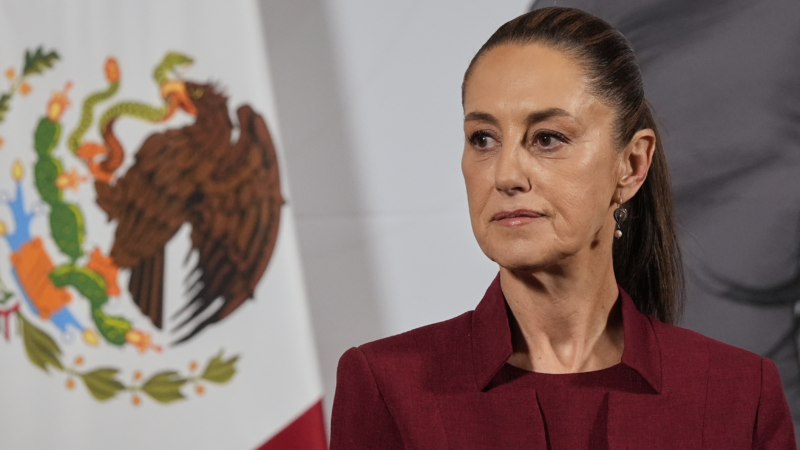Mexico’s president says she rejected Trump’s plan to send US troops across the border
MEXICO CITY — Mexican President Claudia Sheinbaum said on Saturday that U.S. President Donald Trump proposed sending American troops into Mexico to help her administration fight drug trafficking but that she rejected it.
Her remarks to supporters in eastern Mexico came in response to a Wall Street Journal article published the day before, describing a tense phone call last month in which Trump reportedly pressured her to accept a bigger role for the U.S. military in combating drug cartels in Mexico.
“He said, ‘How can we help you fight drug trafficking? I propose that the United States military come in and help you.’ And you know what I said to him? ‘No, President Trump.'”
She added: “Sovereignty is not for sale. Sovereignty is loved and defended.”
White House National Security Council spokesman James Hewitt said in a statement later Saturday that Trump has worked closely with Mexico’s president “to achieve the most secure southwest border in history.”
“Dangerous Foreign Terrorist Organizations, however, continue to threaten our shared security and the drugs and crime they spread threaten American communities across the country,” the statement said. “The President has been crystal clear that Mexico must do more do combat these gangs and cartels and the United States stands ready to assist and expand the already close cooperation between our two countries.”
The U.S. military presence has increased steadily along its southern border with Mexico in recent months, following Trump’s order in January to increase the army’s role in stemming the flow of migrants.
The U.S. Northern Command has surged troops and equipment to the border, increased manned surveillance flights to monitor fentanyl trafficking along the border and sought expanded authority for U.S. Special Forces to work closely with Mexican forces conducting operations against cartels.
Trump designated many of the gangs and cartels smuggling drugs into the U.S. as foreign terrorist organizations on Feb. 19, restricting their movements and lending law enforcement more resources to act against them.
But Sheinbaum’s hardline stance Saturday signaled that U.S. pressure for unilateral military intervention would put her and Trump on a collision course after months of cooperation on immigration and trade.
“We can work together, but you in your territory and us in ours,” Sheinbaum said.
Mideast clashes breach Olympic truce as athletes gather for Winter Paralympic Games
Fighting intensified in the Middle East during the Olympic truce, in effect through March 15. Flights are being disrupted as athletes and families converge on Italy for the Winter Paralympics.
A U.S. scholarship thrills a teacher in India. Then came the soul-crushing questions
She was thrilled to become the first teacher from a government-sponsored school in India to get a Fulbright exchange award to learn from U.S. schools. People asked two questions that clouded her joy.
Sunday Puzzle: Sandwiched
NPR's Ayesha Rascoe plays the puzzle with WXXI listener Jonathan Black and Weekend Edition Puzzlemaster Will Shortz.
U.S.-Israeli strikes in Iran continue into 2nd day, as the region faces turmoil
Israel said on Sunday it had launched more attacks on Iran, while the Iranian government continued strikes on Israel and on U.S. targets in Gulf states, Iraq and Jordan.
Trump warns Iran not to retaliate after Ayatollah Ali Khamenei is killed
The Iranian government has announced 40 days of mourning. The country's supreme leader was killed following an attack launched by the U.S. and Israel on Saturday against Iran.
Iran fires missiles at Israel and Gulf states after U.S.-Israeli strike kills Khamenei
Iran fired missiles at targets in Israel and Gulf Arab states Sunday after vowing massive retaliation for the killing of Supreme Leader Ayatollah Ali Khamenei by the United States and Israel.








